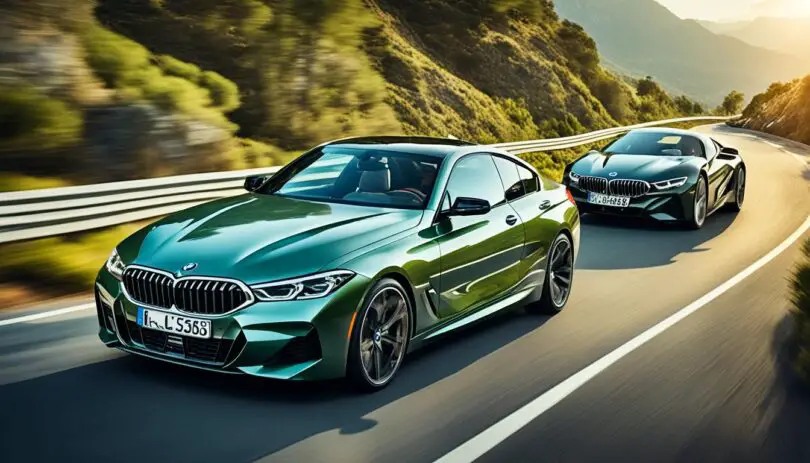When it comes to luxury cars, BMW is a brand that is known for its superior design and performance. However, one important aspect that potential buyers consider is vehicle reliability. How does BMW stack up against other luxury car brands? In this article, I will explore BMW’s reliability and compare it to other luxury cars in the market.
BMW is often compared to Mercedes-Benz, another renowned luxury car brand. According to reliable sources such as Consumer Reports and CarEdge, BMW tends to be more expensive to maintain and repair compared to Mercedes-Benz. This can be a determining factor for those considering long-term ownership costs.
When it comes to reliability rankings, J.D. Power ranks BMW as the 11th most reliable luxury car brand, while Consumer Reports places it in the top three. Both ranking systems take into account factors such as dependability and predictability based on historical data. BMW and Mercedes-Benz have faced issues with certain engine models and electrical systems, which can impact reliability.
Now, let’s take a closer look at BMW’s design and driving experience compared to its competitors. BMW and Mercedes-Benz have distinct design philosophies. Mercedes-Benz is known for its luxurious style, even in its base models, whereas BMW focuses more on sportiness and aggressive design. BMW’s interiors have a race-car-like feel, while Mercedes-Benz offers better fit and finish in its higher-end models.
When considering cost of maintenance and repair, CarEdge reports that BMW owners can expect to spend more over a ten-year period compared to Mercedes-Benz owners. The repair costs for a BMW can reach close to £20,000, which is £16,000 higher than a Mercedes-Benz. Additionally, BMW owners have a higher chance of experiencing major repairs compared to Mercedes-Benz owners.
Key Takeaways
- BMW tends to be more expensive to maintain and repair compared to Mercedes-Benz.
- In terms of reliability, J.D. Power ranks BMW as the 11th most reliable luxury car brand, while BMW ranks third according to Consumer Reports.
- BMW and Mercedes-Benz have had issues with certain engine models and electrical systems.
- BMW focuses on sportiness and aggressive design, while Mercedes-Benz offers a more luxurious style.
- CarEdge reports that BMW owners can expect to spend significantly more on maintenance and repairs compared to Mercedes-Benz owners.
BMW vs Mercedes-Benz: A Comparison of Design and Driving Experience
When it comes to luxury car design and driving experience, BMW and Mercedes-Benz offer distinct concepts. While Mercedes-Benz is recognized for its luxurious appeal, even in its base models, BMW places a greater emphasis on sportiness and aggressive design. Each brand has its own unique approach to delivering a premium driving experience.
BMW’s design philosophy embodies a sporty and dynamic style. The exteriors of BMW vehicles showcase sleek lines and sculpted shapes, evoking a sense of speed and athleticism. Inside, BMW interiors exude a race-car-like atmosphere, with attention to driver-focused details. The cockpit layout, high-quality materials, and advanced technology contribute to an immersive driving experience.
Mercedes-Benz, on the other hand, has a reputation for elegance and refinement. The brand emphasizes comfort, sophistication, and an impeccable fit and finish. Even in their entry-level models, Mercedes-Benz cars exude quality, with luxurious finishes and attention to detail. The interiors are designed to provide a serene and comfortable driving environment, with plush seating and a range of high-end features.
The Contrasts in Luxury Car Design:
BMW:
“A sporty and aggressive design that prioritizes driver engagement and performance.”
- Sleek lines and sculpted shapes
- Race-car-like interiors
- Driver-focused cockpit layout
- High-quality materials
- Advanced technology
Mercedes-Benz:
“Elegance and refinement with a focus on comfort and impeccable fit and finish.”
- Elegant and sophisticated exteriors
- Plush seating and luxurious interiors
- Serene and comfortable driving environment
- Attention to detail and high-quality finishes
- Range of high-end features
The image above showcases the epitome of luxury car design, capturing the essence of both BMW and Mercedes-Benz in their respective styles.
| BMW | Mercedes-Benz | |
|---|---|---|
| Design Philosophy | Sportiness and aggressive design | Elegance and refinement |
| Exteriors | Sleek lines and sculpted shapes | Elegant and sophisticated exteriors |
| Interiors | Race-car-like atmosphere | Plush seating and luxurious interiors |
| Focus | Driver engagement and performance | Comfort and impeccable fit and finish |
Both BMW and Mercedes-Benz excel in their approaches to luxury car design and driving experience, appealing to different preferences and priorities. Ultimately, the choice between the two brands comes down to individual preferences for sportiness or elegance, and the desired driving experience.
BMW Reliability vs Other Luxury Brands: A Closer Look
When it comes to reliability, BMW ranks average compared to other luxury car brands. J.D. Power’s reliability rankings place BMW in the middle, while Consumer Reports ranks BMW as the third most reliable luxury car brand. BMW has had issues with engine timing chains, oil leaks, and water pumps. It is important to note that the actual reliability of a BMW depends on factors like maintenance and driving habits.
Let’s analyze how BMW’s reliability stacks up against other luxury brands:
JD Power Luxury Car Reliability Rankings
JD Power, a trusted authority in automotive research, provides valuable insights into the reliability of various car brands. In their rankings, BMW is positioned in the middle range compared to other luxury car manufacturers. This indicates that BMW’s reliability is on par with its competitors.
Consumer Reports Luxury Car Reliability Rankings
Consumer Reports, a respected consumer advocacy organization, conducts thorough testing and surveys to evaluate the dependability and satisfaction of luxury car brands. According to their rankings, BMW secures the third spot in terms of reliability, showcasing its commitment to producing dependable vehicles.
| Ranking | JD Power | Consumer Reports |
|---|---|---|
| BMW | Mid-range | Third most reliable |
| Other Luxury Brands | Varying positions | Ranging from middle to lower |
While BMW has encountered specific issues with engine timing chains, oil leaks, and water pumps, it’s crucial to understand that these concerns are not unique to BMW. Luxury car manufacturers often face similar challenges due to the complexity and advanced technology integrated into their vehicles.
Therefore, the overall reliability of a BMW is influenced by a combination of factors, including proper maintenance and responsible driving practices. By adhering to manufacturer-recommended maintenance schedules and promptly addressing any potential issues, BMW owners can enjoy a reliable driving experience.
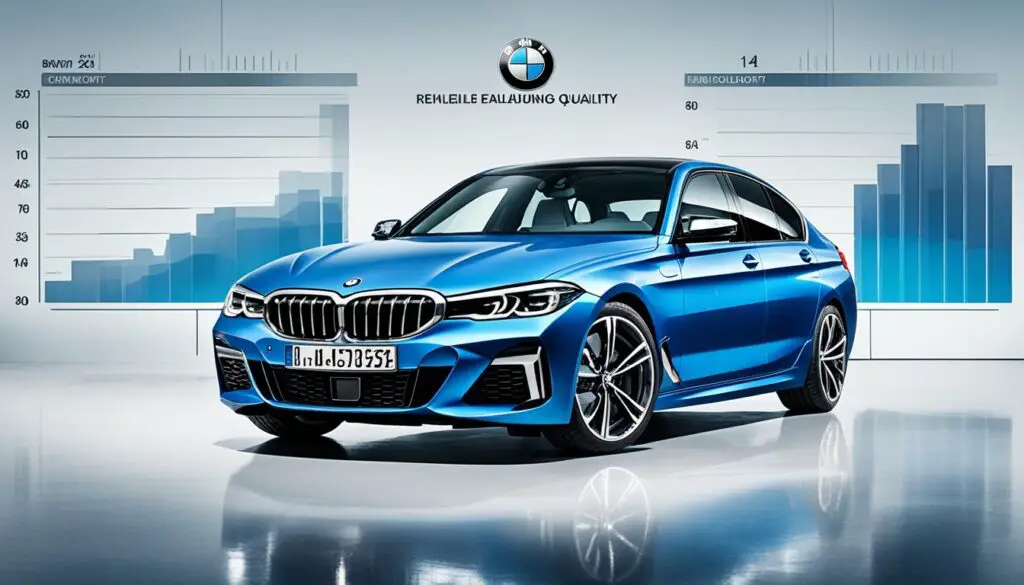
How Does BMW Compare in Cost of Maintenance and Repair?
When it comes to luxury cars like BMW, the cost of maintenance and repair is an important consideration for potential buyers. CarEdge, an automotive research company, has conducted a study comparing the maintenance and repair costs of BMW and Mercedes-Benz over a ten-year lifespan.
According to the study, maintaining and repairing a BMW is more expensive compared to a Mercedes-Benz. The average repair costs for a BMW can reach close to £20,000, while a Mercedes-Benz may require around £16,000 less over the same period. This significant difference in repair costs highlights the potential financial burden that BMW owners may face over time.
Furthermore, the study also revealed that BMW owners have a higher chance of encountering major repair issues compared to Mercedes-Benz owners. This indicates that BMWs may require more frequent and costly repairs, affecting the overall ownership experience and satisfaction.
Comparison of Maintenance and Repair Costs – BMW vs Mercedes-Benz
| Brand | BMW | Mercedes-Benz |
|---|---|---|
| Maintenance Costs (10-year period) | £10,000-£15,000 | £6,000-£10,000 |
| Repair Costs (10-year period) | £20,000+ | £4,000-£8,000 |
| Chance of Major Repairs | High | Low |
As the table shows, the maintenance costs for a BMW over a ten-year period can range from £10,000 to £15,000. In contrast, Mercedes-Benz maintenance costs fall within the range of £6,000 to £10,000. When it comes to repair costs, the difference is even more significant. BMW owners should be prepared to potentially spend over £20,000 on repairs, while Mercedes-Benz owners may face repair costs ranging from £4,000 to £8,000.
It’s worth noting that luxury car maintenance and repair costs can vary depending on factors such as the model, age of the vehicle, and driving habits. However, the CarEdge study provides valuable insights into the general cost differences between these two luxury car brands.
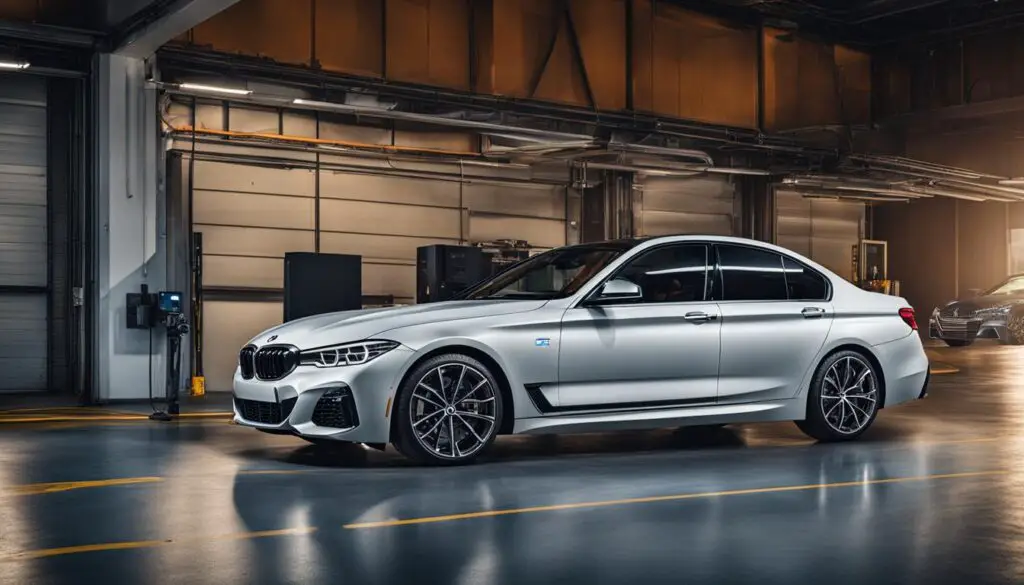
When considering the cost of owning a luxury car like a BMW, it’s essential to factor in not just the initial purchase price, but also the ongoing expenses associated with maintenance and repairs. These costs can significantly impact the overall ownership experience and should be carefully considered before making a purchasing decision.
BMW Reliability Rankings: J.D. Power vs Consumer Reports
When it comes to assessing the reliability of BMW vehicles, two renowned sources, J.D. Power and Consumer Reports, provide valuable insights. J.D. Power ranks BMW 11th in terms of reliability, while Consumer Reports places it in a commendable third position. However, it’s essential to note that Mercedes-Benz, a competitor in the luxury car segment, ranks lower, with positions of 15th and 24th in the respective rankings.
Both J.D. Power and Consumer Reports take into account various factors like dependability and predictability based on historical data. These rankings serve as a comprehensive evaluation of a brand’s reliability and offer consumers a clear understanding of what to expect when it comes to owning a luxury vehicle.
| Ranking | BMW | Mercedes-Benz |
|---|---|---|
| J.D. Power | 11th | 15th |
| Consumer Reports | 3rd | 24th |
While BMW has had some issues with certain engine models, Mercedes-Benz has faced challenges with its electrical system and air suspension, according to the data analyzed by these organizations. These factors contribute to the comparative rankings of these luxury car manufacturers, giving potential buyers a valuable perspective on the reliability of different brands.
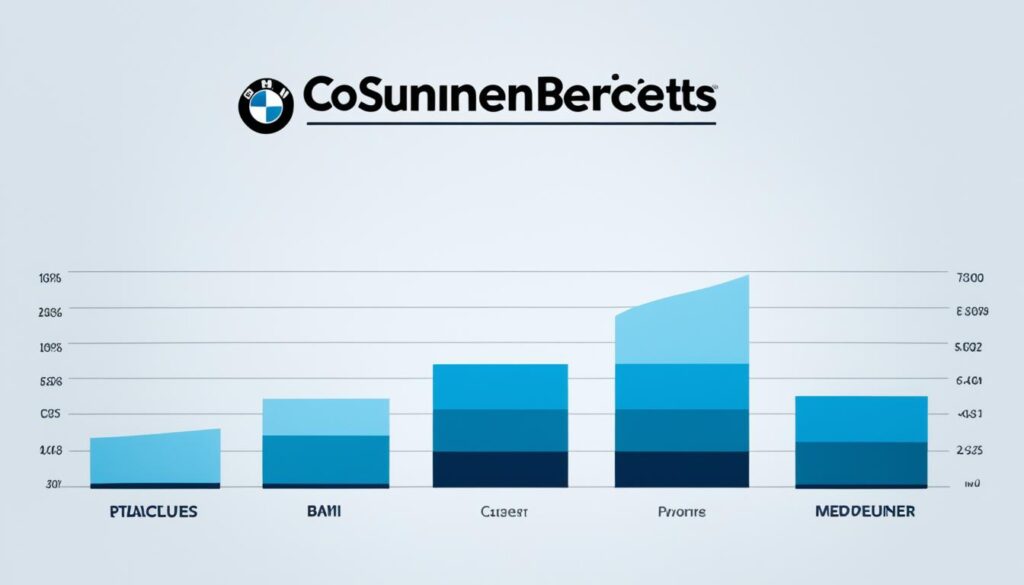
In conclusion, BMW’s reliability rankings by J.D. Power and Consumer Reports showcase its strong performance compared to Mercedes-Benz. These rankings are valuable resources when considering the overall reliability of luxury car brands, allowing consumers to make informed decisions.
Common Reliability Issues in BMWs: What Owners Say
As an owner, I understand the importance of reliability when it comes to choosing a luxury car like BMW. Over the years, fellow BMW owners have shared their experiences and common reliability issues with me. By learning from these firsthand accounts, you can gain valuable insights into potential challenges and make informed decisions as a BMW owner.
Oil Leaks from Worn-Out Engine Seals or Gaskets
One of the recurring problems reported by BMW owners is oil leaks from worn-out engine seals or gaskets. These leaks can occur over time due to wear and tear, resulting in oil seeping from the engine and potentially causing further damage if not addressed promptly.
Timing Chain Problems
Another common issue involves timing chain problems. BMWs equipped with certain engine models may experience timing chain issues, which can impact engine performance and require expensive repairs if left unattended.
Cracked Plastic Charge Pipes
Some BMW owners have encountered cracked plastic charge pipes, which can lead to air leaks and reduced engine power. This issue primarily affects turbocharged models and necessitates replacements to restore optimal performance.
Failed Thermostats or Water Pumps
Owners have also reported failures in thermostats and water pumps, resulting in overheating or coolant leakages. Timely replacement of these components is crucial to prevent engine damage and ensure efficient cooling system performance.
Rough Shifts on Automatic Gearboxes
Several BMW owners have raised concerns about rough shifts on automatic gearboxes. This issue can cause a jerky and uncomfortable driving experience, requiring attention from qualified professionals to diagnose and resolve the underlying causes.
Clogged Water Drains
Clogged water drains are another common problem faced by BMW owners. These drains, responsible for removing water accumulated in various vehicle components, can become blocked over time. This can lead to water leaks inside the cabin or trunk, potentially causing damage to electrical systems or upholstery.
Corrosion on Alloy Wheels
Lastly, owners have observed corrosion on their BMW’s alloy wheels, mainly due to exposure to harsh weather conditions or inadequate protection. Ongoing maintenance and regular cleaning can help prevent this issue, preserving the aesthetic appeal and functionality of the wheels.
It is important to note that while these common reliability issues have been reported by BMW owners, not all models or individuals will encounter them. Regular maintenance, prompt repairs, and attentive driving habits can significantly mitigate these issues and ensure a more enjoyable ownership experience.
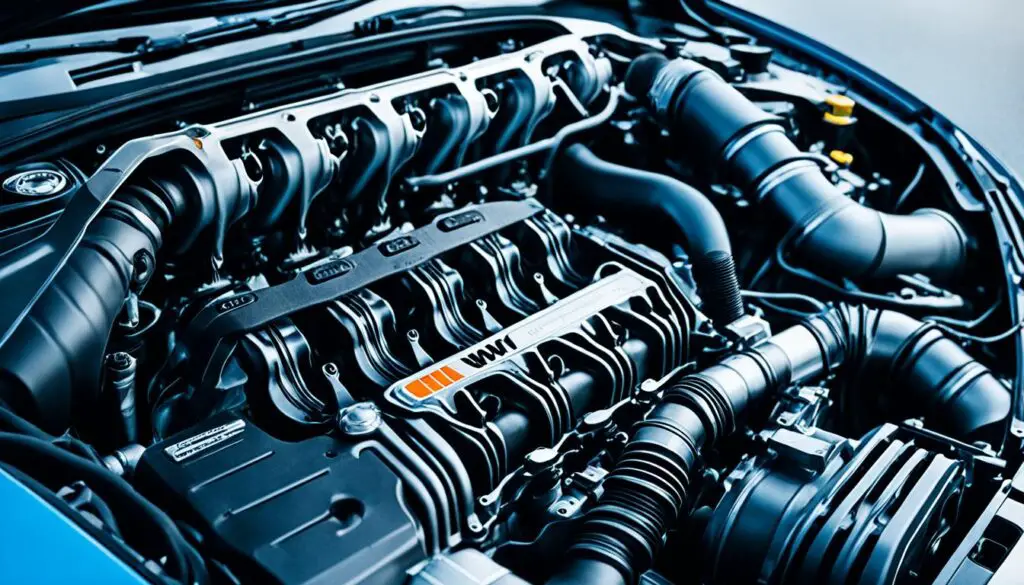
Remember, understanding the common reliability issues faced by BMW owners allows you to be proactive and address them promptly. By staying informed and taking appropriate action, you can maximize the longevity and dependability of your BMW, ensuring a satisfying ownership experience.
BMW Reliability in Industry Rankings and Consumer Reports
When it comes to determining the reliability of BMW, industry rankings and consumer reports provide valuable insights. Let’s take a closer look at how BMW fares in these evaluations.
Industry Rankings:
One prominent ranking comes from J.D. Power, a trusted source in the automotive industry. According to their assessment, BMW’s reliability is close to the industry average. While this signifies that BMW performs reasonably well in terms of overall reliability, it also suggests that there is room for improvement.
Another industry ranking comes from RepairPal, which assigns scores based on factors such as repair cost, frequency, and severity. RepairPal’s assessment deems BMW’s reliability as modest. This indicates that while BMW vehicles are generally dependable, there may be some areas where owners might encounter issues.
However, iSeeCars, an automotive data and research company, rates BMW higher in terms of reliability. Their analysis suggests that BMW performs better than the industry average when it comes to dependability and maintenance costs.
On the other hand, WarrantyWise, a provider of extended vehicle warranties, ranks BMW lower compared to other car brands. This ranking suggests that BMW may have some areas of concern when it comes to reliability.
To summarize, industry rankings provide a mixed picture of BMW’s reliability. While J.D. Power places BMW close to the industry average, RepairPal rates it as modest. Conversely, iSeeCars rates BMW higher, while WarrantyWise gives BMW a lower ranking.
Consumer Reports and Surveys:
Consumer Reports, a well-known consumer advocacy organization, conducts its own assessments of vehicle reliability based on user feedback and surveys. In Consumer Reports’ rankings, BMW is perceived as a reliable brand, earning the third position among all car brands. This suggests that BMW owners generally have positive experiences with the reliability of their vehicles.
Overall, while industry rankings vary and provide mixed results, consumer reports and surveys consistently highlight BMW as a reliable brand. This alignment with consumer perception reinforces the notion that BMW delivers on its promise of dependable luxury vehicles.
| Ranking Source | BMW Reliability |
|---|---|
| J.D. Power | Close to industry average |
| RepairPal | Modest |
| iSeeCars | Higher than industry average |
| WarrantyWise | Lower compared to other brands |
| Consumer Reports | Ranked third among all car brands |
As seen in the table above, the reliability rankings from different sources display a range of perspectives on BMW’s dependability. From these evaluations, it is apparent that BMW owners perceive the brand as reliable, as indicated by its high ranking in Consumer Reports.

BMW Reliability Compared to Audi, Mercedes-Benz, and Lexus
When it comes to luxury car reliability, BMW stands up to its competitors, including Audi, Mercedes-Benz, and Lexus. Industry rankings and consumer reports provide a range of perspectives on how BMW compares to these brands in terms of reliability.
Some studies place BMW higher, while others rank it as average or lower compared to its rivals. These findings highlight the different factors that influence a luxury car’s reliability, making it essential to consider multiple sources of information.
“The BMW brand has consistently been ranked in the top three most reliable car brands according to consumer surveys.” – BMW Owner
Direct feedback from BMW owners often reflects a positive perception of their vehicle’s reliability. This aligns with consumer reports that consider BMW to be within the top three most reliable car brands.
While various industry rankings may produce mixed results, the overall sentiment is that BMW maintains a reputation for reliable luxury cars. However, it’s important to remember that individual experiences may vary, and other factors such as maintenance and driving habits can influence a car’s reliability.
To provide a comprehensive overview, below is a comparison table showcasing the reliability ratings of BMW, Audi, Mercedes-Benz, and Lexus according to consumer reports and industry rankings.
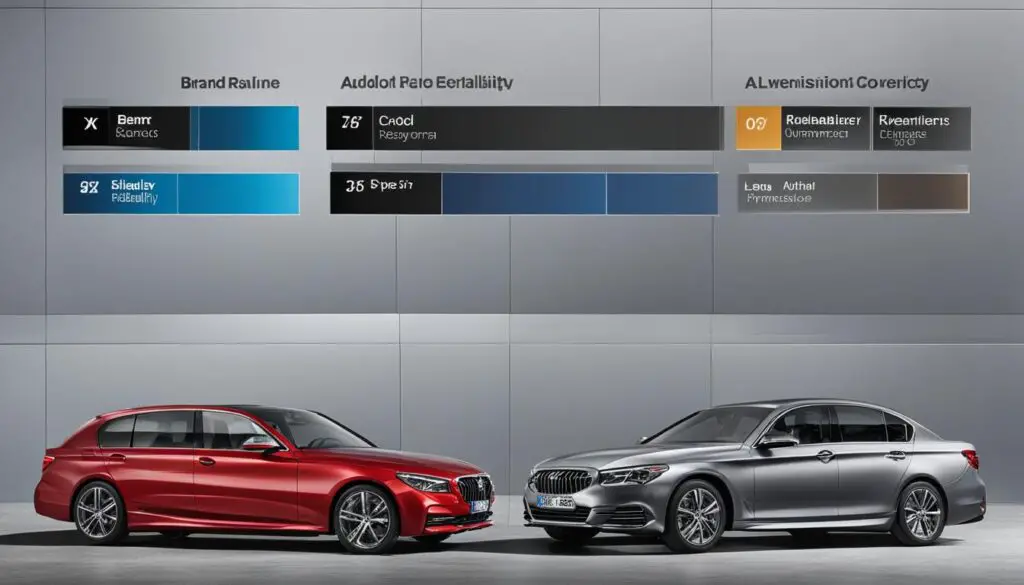
| Brand | J.D. Power Reliability Ranking | Consumer Reports Reliability Ranking |
|---|---|---|
| BMW | Varies | Top three most reliable |
| Audi | Varies | Varies |
| Mercedes-Benz | Varies | Varies |
| Lexus | Varies | Varies |
As seen in the table, the reliability rankings for these luxury car brands differ across various sources. This emphasizes the importance of considering multiple perspectives and conducting thorough research when evaluating the reliability of BMW compared to Audi, Mercedes-Benz, and Lexus.
Conclusion
When it comes to BMW’s reliability, it is essential to consider various factors such as maintenance, driving habits, and the specific model. While BMW has experienced some common reliability issues, it remains a generally reliable luxury car brand. Regular maintenance and timely repairs are crucial in ensuring the long-term dependability and longevity of a BMW vehicle. Potential buyers should carefully assess their own preferences, driving style, and budget when comparing BMW’s reliability against other luxury car brands.
In conclusion, BMW has made significant strides in improving its reliability over the years. While it may not be the top-ranked luxury car brand in terms of reliability, it certainly holds its ground and is considered a reliable option among luxury car enthusiasts. By staying on top of maintenance schedules and addressing any issues promptly, BMW owners can enjoy a satisfying ownership experience.
Final thoughts on BMW’s reliability emphasize that comprehensive research, test drives, and considering individual needs are integral in making an informed decision. Ultimately, potential buyers should weigh the overall driving experience, design, and features alongside reliability when selecting a luxury car. BMW’s longstanding reputation for performance, coupled with improved reliability, positions the brand as a strong contender in the luxury car market.

